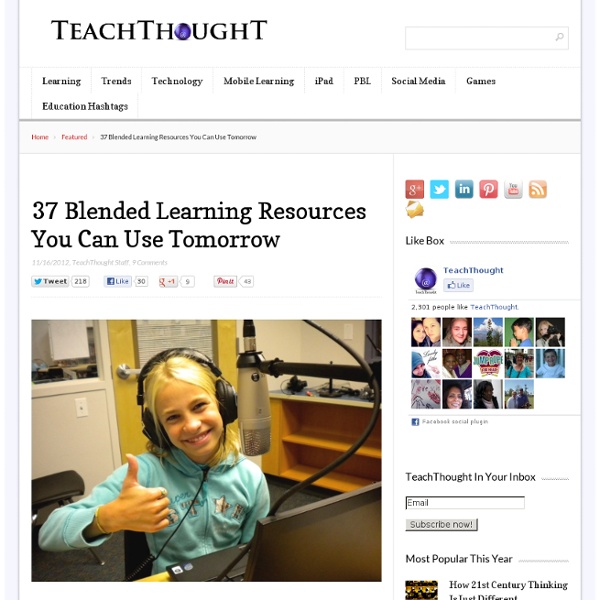



http://www.teachthought.com/teaching/37-blended-learning-resources-you-can-use-tomorrow/
How do students cope with self-paced blended learning? The learning rates in a vanguard self-paced blended learning course have increased dramatically, and we think we know why A new school year. Students new to middle school from primary school. A new subject with a new pedagogy. Teacher Autonomy and Blended Learning at USC Hybrid High School Earlier this month I had the privilege of visiting the USC Hybrid High School (HHS), a new charter school in Los Angeles and winner of a Bill & Melinda Gates Foundation’s Next Generation Learning Challenges grant. HHS is pursuing a blended and competency-based model—that is, the school is leveraging technology to deliver some academic content online and building opportunities for students to advance upon mastery, rather than according to hours of instruction. HHS has seen numerous iterations over its past two years in existence (EdSurge’s Mary Jo Madda did a great write up of these changes earlier this year). For example, last year the school used Apex Learning almost exclusively to drive a Flex blended-learning model (wherein online learning is the backbone, and teachers work with students one-on-one and in groups on projects and tutorials).
How to Successfully Implement a Blended Learning Program No educational technology topics were off limits, and for good reason, during last week’s NCTies. Everything from identity management to flipping the classroom was fair game, and with the state’s NCEdCloud initiative still somewhat of a mystery, there’s a lot of change going on in the Tar Heel State. One session that caught the attention of many educators during the day-and-a-half long event was on blended learning in the elementary school classroom. Rebecca Phillips and Emily Schmidt from Coltrane Webb STEM Elementary guided a crowded room of teachers on how to successfully implement a blended learning program.
The Blended Learning Pathway Infographic Blended Learning Infograpics At the Blended Learning Pathway Infographic you will find tips for successful blended learning implementation. Most schools want Blended Learning, do not have a strategic plan for implementation. Via: www.DigitalPLN.com Self-paced blended learning highlights ‘average’ student myth By Peter West Read more by Contributor March 18th, 2014 Data from a middle school self-paced blended learning class reinforces the concept that variation from one student to the next is significant “If you design something for the average …person, wouldn’t it fit most people?” Todd Rose – The Myth of Average: from TEDx This seems like a natural conclusion to draw, but research has shown this is incorrect.
10 Blended Learning Trends Infographic Blended Learning Infograpics The 10 Blended Learning Trends Infographic gives a snapshot on how making student learning more personalized, more engaging, and more collaborative is what’s driving innovation. The student-centered learning experienceSoaring numbers of digital learnersBuilding higher-order thinking skillsRealizing benefits for both teachers and studentsA framework for data-driven decision-making in educationPersonalized learning accompanied by a lean, blended, interactive approachProductive GamificationThe mobile world is where learner live nowStudents’ personal access to mobile devicesMore broadband, please! Via: www.dreambox.com Embed This Education Infographic on your Site or Blog! 20 tips and features of blended learning programs As more blended learning programs pop up, its benefits become more evident Blended learning programs are growing in popularity across the U.S., as more educators and students seek to personalize teaching and learning through education programs that combine face-to-face learning with online instruction and content delivery. Research from Digital Learning Now! indicates that blended learning increases student and teacher productivity, and provides school leaders with “more and better data that creates an integrated and customizable learning experience.”
Four Essential Principles of Blended Learning As schools become more savvy about blended-learning tactics– the practice of mixing online and in-person instruction — guidelines and best practices are emerging from lessons learned. Here are four crucial factors to keep in mind as schools plunge in. The single biggest piece of advice offered by most blended learning pioneers is to have a cohesive vision for how the technology will enhance specific learning goals, how it will ease the burden on teachers, and how it can make both teachers and students more creative learners. A big part of creating that vision is having strong leadership at all levels.
Blended learning revolution: Tech meets tradition in the classroom Fourteen-year-old Gabi Directo is technically in the middle of her freshman year. But in bursts of learning, hunched over her laptop in her Summit Shasta High School classroom, she has managed to zoom at her own rapid pace to the completion of all of her ninth-grade English, history, science, and math classes. By February, she was digging into her sophomore year Advanced Placement biology, physics, and Algebra II classes. Skip to next paragraph Subscribe Today to the Monitor Click Here for your FREE 30 DAYS ofThe Christian Science MonitorWeekly Digital Edition
A Two-Gear Construct for Envisioning Blended Learning Teachers using blended learning correctly can be one of the best ways for students to meet the challenge of the Common Core and develop ownership of their learning. But what does "done correctly" mean? If a teacher moves from a traditional teaching style (Point A) to using blended learning correctly (Point B), what does Point B look like? 34 Diverse Blended Learning Apps For iPad 34 Diverse Blended Learning Apps For iPad This post is promoted by the app X-Mirage, software that allows you to mirror content between your iPad & Mac, and record the displayed content. Blended learning is a potentially powerful way of mixing the power of asynchronous access with face-to-face facilitation and instruction. It’s this mixing of old and new that makes it tempting for many schools and districts wanting to dip their toes in the water of eLearning and far-reaching technology access while still depending on the expertise and training of human teachers.